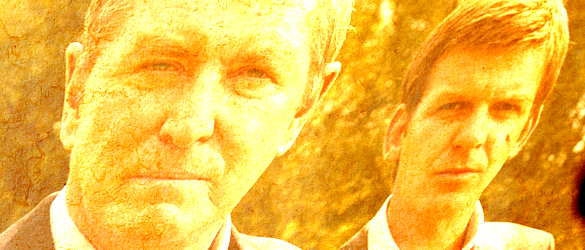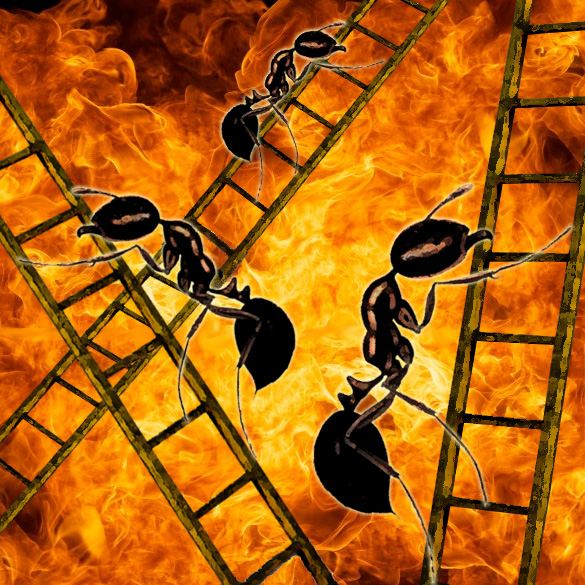The house is empty except for me. I move slowly, remembering myself—this is the way my neck falls into my shoulder, arm, wrist, fingers. Here are my legs, still pale after long exposure to England’s sunlight, slow-summering. These are my lungs, filling, settling. After five weeks in the constant company of friends, I have forgotten the length of my own hair, the dent in the bridge of my nose, the curvature of my spine. I cannot think of the last time I looked in a mirror and saw only myself.
My job, now, is leaving. My bags are packed, lights turned off, jacket and shoes laid out already for the journey from Bath to Selsey. I eat my lunch in silence upstairs—the last of the sausage rolls, red tomatoes and chevre on crusty bread, pressed apple juice—but leave the television on a rerun of Midsomer Murders. Even the sound of a small fictional village’s population being decimated by a series of violent crimes is better than the sounds of the old house leavening, our departure its own form of decompression.
The train journey is blasted with sunshine. I am in a car with seaside revelers, a family on a weekend holiday and a couple whose noses touch and do not touch with a new kind of intimacy. I read Heaney, words I spoke to myself the last time I rode Southern Rail down to the sea, all butter and brightness and wet strung out on a line, “The damp and slump and unfair / Drag of the workday / Made light of and got through, / As usual, brilliantly.”
I nod off between poems, wake with a start to the movement of the car. For the first time in weeks, I write something down that is not part of an academic essay: I remember the spikes on each vaulted surface in the train station meant to ward off birds, the silhouettes of seagulls as they coasted on the day’s warm air and lighted on adjacent roofs, hungry for sandwich crumbs and other leavings. I remember the body of one bird, black and tense with current, that lay broken on the track, its exposed breast picked open and over by its own kind. But mostly I remember how no person would look at it, raw like that, its death obvious and unnatural. No one watched our barrel-gutted train roll over its body to stop for us, a kind of temporary tomb. But it isn’t as if I was shouting, either.
My grandfather waits for me at the station, dressed in his usual khaki trousers and vest, a bucket hat covering his balding pate. We have not seen each other in three years. We do not hug. It takes me a trip around the grocer’s and the thirty-minute drive to my grandparents’ home to adjust my volume level to his deafness, as overwhelming as it has become in recent years. In the car he cannot hear me at all over the noise of the engine, the air conditioning, the low hum he is always hearing beneath everything else. He points out the landmarks I remember from my childhood—a bed and breakfast called The Spotted Cow, a pub at the sharpest turn in the road called, appropriately, the Anchor, the garden center and tea room we used to visit, now only a garden center. He cannot hear me when I tell him I remember these places to myself before I sleep, some nights. This kind of homing smacks of sentimentality, something he does not care to understand.
My grandmother is ready with tea when we walk in. I have missed her smell, leaves and milk. Her eyes are bright and wide when she sees me. To her I am tall as anything, clever as anything, beautiful as anything, the firstborn, which still means something to her. We have little to say to each other, separated, as we are, by more than sixty years, but we cover books, the news, my cats at home. Each of us watches the other with love and, often, worry. The thickening of her legs is a horror I have had to get used to as she ages, has hips replaced, exercises, exercises, exercises. All she knows of my exploits is what she has heard over the phone, my mother relating achievements, travel plans, and any romantic relationships, burgeoning or broken. Instead of asking, we watch, attentive to small missteps, brief pauses and revisions in the conversation. This is only the second time my grandparents have seen me without my parents and younger sister. They are keen to learn how I have shaped myself.
After dinner, each of them falls asleep in their chairs in front of the television. I watch the rest of the comedy panel shows that play after the watershed on profanity lifts at 9 PM, the sun only just gone behind the high woven fences in their back garden. When the shows end, I do not turn off the television, do not wake them, do not go to bed. I watch my grandfather’s head as it sinks low into his chest, accentuating the stoop of his shoulders. My grandmother has forced her head back, mouth slightly open, neck exposed. I remember how each hates to watch the other sleep, thinking the other already dead. When I am not visiting, they sleep in separate beds to avoid the horror of waking up to find the other has gone, right next to them, in the night.
I waited, for five weeks, to be alone in the company of my grandparents, knowing already their silences, their willingness to give me space to walk by myself for hours at the sea shore, swimming, watching the boats come in, meeting dogs and old couples and young children in the surf. Watching them sleep, I remember the fears of my childhood—being left in my room in the dark, waking to an empty house, losing my family in an accident—and feel them, heavily, presently, for the first time in years. I watch them sleep. I try to read. I fall asleep in my chair.
—-
Stumped, as usual, by the request for information about herself presented in the third person, Helen Alston surrenders her astrological sign (Sagittarius), her shoe size (9 ½), and her location (Charlottesville, VA). The rest of her life is forthcoming.



I just love this reminiscence. Simple, strong, and full of the quiet sentiment the grandfather “does not wish to understand. Each image feels full and I, as reader, feel the “alone” of the narrator like a blessing.
Why can’t I construct with words like you, Helen? Molecules are easy, they are universal, but words must MEAN something, an understanding, between the writer and the reader. Too many commas, I think.